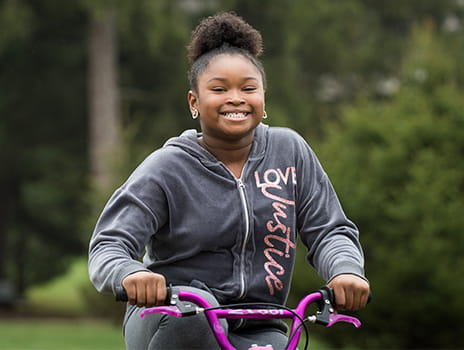Taking Control of Her Health


March 01, 2019
Updated July 2, 2024
Like many children in America, Skylar Wyatt was overweight.
"Skylar was gaining maybe 10 lbs. a month every couple of months," says Keya Spller, Skylar's mother. "The doctor was concerned."
Pediatrician Laura Blasi, MD, at The University of Kansas Health System has spent the last year helping Skylar learn to eat right, exercise and manage her weight. She says that childhood in Kansas City is not uncommon, as obesity affects 1 in 5 children and adolescents in the United States. Monitoring children for proper growth is the responsibility of all pediatricians, but Dr. Blasi and other pediatricians at the health system have a program for children like Skylar who may need help achieving a health weight.
"At well-child visits, we review our patients' growth – specifically height, weight and body mass index," says Dr. Blasi. "For Skylar, this was a focus from our first visit, given her personal history and her family history of risk factors.

The number of obese or overweight children in America has been rising for years, and the reasons are varied and complex. In addition to diet and lifestyle influences, research shows that children are also more susceptible to obesity due to factors beyond their control, like genetic predisposition, family history, race and socioeconomic status.
In Skylar's case, her mother has been diagnosed with pre-diabetes and her grandmother has diabetes.
"We didn't want her to fall into that same trap," says Keya.
Overweight or obese children are susceptible to a number of health issues, including high blood pressure and cholesterol, insulin resistance, type 2 diabetes, sleep apnea and fatty liver disease, among others. More recent studies also suggest that childhood obesity may be contributing to more cancers in young adults.
"The health risks to children who are overweight or obese are the same for adults," says Dr. Blasi. "Children who are obese are more likely to become adults who are obese, and their obesity and disease risk factors in adulthood are likely to be more severe."
But childhood obesity can also have strong emotional consequences, like anxiety, depression and low self-esteem. Approaching the subject of weight can be tricky, too, as body image and self-worth are often closely connected for children and adolescents.
"It is important as a pediatrician to discuss healthy weight and body mass index and use the appropriate terms, Dr. Blasi explains. "But, with children who are Skylar's age, the focus should be placed on making healthy choices – eating healthy foods, staying active, for example, rather than on losing weight or fixating on the numbers."
To keep Skylar focused on her health rather than her appearance, Dr. Blasi approached the subject of weight loss using phrases like "balanced diet," "healthy eating" and "portion control." She helped Skylar learn how to differentiate between a meal and a snack, and encouraged her to eat more fruits and vegetables. This helped Skylar become more aware of what she put into her body without counting calories or banning certain foods.
"A diet is like when you don't want to do something. Like, you don't want to eat chocolate," says Skylar. "I'm doing a lifestyle change. It's two different things."
Soon, Skylar was making healthier choices and exercising more. She had regular follow-up visits with Dr. Blasi every 2-3 months to monitor her progress. Together, they'd talk about Skylar's habits, her food choices and what was or wasn't working. During each consultation, Dr. Blasi continued to focus on Skylar's health rather than her appearance.
Dr. Blasi never used words that could affect my dauther's self-esteem or confidence, and I loved that about her. She really took the time to make sure she wasn't using hurtful words or putting Skylar in a situation that made her think she's fat. – Keya Spiller
Today, Skylar is a healthy, happy 10-year-old who loves riding her bike, dancing and her hoverboard. She competes on her school's dance squad and says her new lifestyle gives her more energy and doesn't tire as easily. To date, she's lost a total of 15 lbs. and has gone from a size 16 to 14.
"I still feel like the same Skylar. But my clothes are too big," she says.
Keya, too, has incorporated much of what Skylar's learned from Dr. Blasi into her lifestyle.
"We had bad habits: I didn't cook regularly, and we snacked a lot. But now, we've cut back on fast food and are exercising more," Keya says. "It's a lifestyle change and she's doing a really good job."
Both Skylar and Keya are grateful to Dr. Blasi for her guidance, education and support.
"The University of Kansas Health System took an interest in what my daughter needed and seroed in on that, and it has changed our life over the past year," Keya says. "Every concern I've ever had about Skylar, Dr. Blasi has addressed."
Many parents mistake obesity in children for chubbiness. Others may not want to focus on a child's weight because they are afraid of causing them to feel self-conscious. But ensuring your child is within a healthy weight range is important for their health now, and in the future.
"My best advice for parents is to take their children to a pediatrician for their annual well-child examinations," Dr. Blasi says. "This is the best way to stay on top of her health concerns and monitor your child's growth and development."